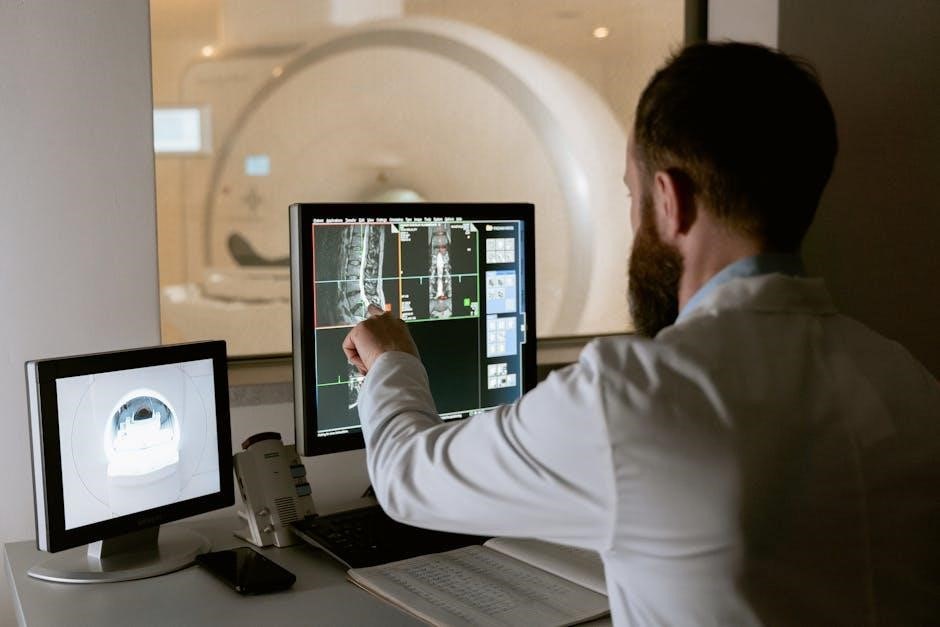
The DISC Personality Test is a widely used assessment tool designed to understand individual behavioral styles. It categorizes personalities into four types: Dominance (D), Influence (I), Steadiness (S), and Conscientiousness (C). This simple, practical model helps individuals and teams improve communication and collaboration in both personal and professional settings. Available as a printable PDF, the test offers a user-friendly way to gain insights into behavior and decision-making styles, fostering personal and professional development.

Overview of the DISC Model
The DISC Model is a framework for understanding behavioral patterns, categorizing individuals into four primary styles: Dominance (D), Influence (I), Steadiness (S), and Conscientiousness (C). Each style reflects different approaches to problem-solving and interaction. The model assesses tendencies like directness and openness, providing insights into communication preferences and decision-making. By identifying these styles, individuals and teams can enhance collaboration and leadership effectiveness.
Importance of Personality Assessments in Personal and Professional Development
Personality assessments like the DISC test are vital for fostering personal and professional growth. They provide insights into behavioral tendencies, aiding in self-awareness and improved decision-making. In professional settings, these tools enhance team dynamics, communication, and leadership effectiveness. By understanding individual styles, organizations can tailor development strategies, leading to better collaboration and productivity. Such assessments also help individuals identify strengths and areas for improvement, promoting overall development and career advancement.

How to Take the Printable DISC Personality Test
The DISC Personality Test is easy to complete. Download and print the free PDF version, then find a quiet spot to answer honestly and accurately.
Step-by-Step Instructions for Completing the Test
Start by downloading and printing the free PDF version of the DISC Personality Test. Set aside a quiet, distraction-free time to complete it honestly. Each of the 24 questions presents four adjectives; rank them from 1 (most like you) to 4 (least like you). After answering, transfer your responses to the provided scoring sheet. Tally your scores for each DISC style (D, I, S, C) to identify your dominant personality type and gain insights into your behavioral preferences.
Downloading and Printing the PDF Version
Accessing the DISC Personality Test is straightforward. Visit a reliable source and download the free PDF version. Ensure your device has a PDF reader installed. Print the document on standard paper, making sure all 24 questions and the scoring sheet are included. Follow the instructions carefully to complete the test accurately. This version is ideal for those who prefer a tactile experience or need to share it with a team or group setting.

Understanding Your DISC Personality Profile
The DISC Personality Test evaluates individuals into four styles: Dominance (D), Influence (I), Steadiness (S), and Conscientiousness (C). The test uses 24 questions to assess behaviors, providing insights into communication and decision-making styles.
Interpreting Your DISC Assessment Results
Interpreting your DISC assessment results involves understanding your scores for Dominance (D), Influence (I), Steadiness (S), and Conscientiousness (C). The test provides a visual profile, showing your behavioral tendencies and preferences. Each style reflects how you approach tasks, interact with others, and respond to challenges. Your scores are plotted on a graph, revealing your primary and secondary traits. This insight helps you identify strengths, areas for growth, and effective communication strategies. Use the scoring sheet to align your answers with your dominant style.
The Four Personality Styles: Dominance (D), Influence (I), Steadiness (S), and Conscientiousness (C)
The DISC model identifies four distinct personality styles. Dominance (D) individuals are assertive and results-driven, focusing on achieving goals. Influence (I) types are outgoing and enthusiastic, excelling in communication. Steadiness (S) personalities are reliable and consistent, valuing stability. Conscientiousness (C) individuals are detail-oriented and analytical, prioritizing accuracy. Each style reflects unique strengths and approaches to work and relationships, helping individuals understand their behavioral tendencies and preferences. Recognizing these styles fosters improved collaboration and personal growth.

Core Components of the DISC Personality Test
The test features 24 questions with four response options each, assessing behavioral preferences. A scoring system identifies dominant traits, providing insights into personality types and tendencies.
The Structure of the Test: 24 Questions with Four Options Each
The DISC Personality Test consists of 24 questions, each presenting four adjectives or phrases. Participants rank these options based on how well they describe their behavior, with 1 being “most like me” and 4 being “least like me.” The questions are designed to assess preferences in various situations, focusing on observable behaviors rather than hidden traits. This straightforward format ensures clarity and ease of completion, making the test accessible to a wide audience.
Scoring the Test: Identifying Your Dominant Personality Type
Scoring the DISC test involves tallying responses for each of the four personality types (D, I, S, C). Participants circle their answers on a worksheet and transfer them to a scoring sheet. Totals for each type are calculated, with the highest score indicating the dominant personality style. Secondary scores reveal tendencies toward other styles. Results are often visualized on a graph, providing a clear overview of individual behavioral preferences and strengths.

Applications of the DISC Personality Test
The DISC Personality Test is widely applied in workplace communication, team building, and leadership development. It helps identify performance styles, aiding in effective collaboration and decision-making among diverse personalities.
Using DISC in Workplace Communication and Team Building
The DISC Personality Test enhances workplace communication by helping individuals understand their colleagues’ behavioral styles. By identifying Dominance, Influence, Steadiness, and Conscientiousness traits, teams can align tasks with strengths, improving collaboration. For instance, D-types excel in decision-making, while S-types ensure stability. This insights-driven approach fosters effective communication, reduces conflicts, and boosts morale, making it a valuable tool for building cohesive and high-performing teams in professional settings.
Applying DISC Insights for Leadership Development
DISC insights empower leaders to refine their styles by understanding their natural tendencies. Leaders can leverage their dominant traits, such as D-type assertiveness or I-type charisma, while developing weaker areas. This self-awareness fosters enhanced decision-making and communication. By adapting to team members’ styles, leaders can motivate effectively, resolve conflicts, and build trust. DISC-based leadership development encourages growth, ensuring leaders inspire and guide their teams more successfully, creating a cohesive and productive work environment.

Benefits and Limitations of the DISC Personality Test
The DISC test offers insights into behavioral styles, enhancing communication and teamwork. However, it may oversimplify complex personalities and requires skilled interpretation for accurate results.
Advantages of Using the DISC Assessment
The DISC assessment provides clear insights into behavioral styles, fostering improved communication and collaboration. It simplifies complex personality traits into four distinct types, making it accessible and practical for workplace applications. The test is easy to administer and interpret, offering actionable feedback for personal and professional growth. Its universal applicability ensures it can be effectively used across diverse teams and industries, promoting better understanding and teamwork.
Potential Drawbacks and Misuses of the Test
While the DISC assessment is valuable, it has limitations. Its simplicity may oversimplify complex personalities, ignoring nuances. Over-reliance on the test can lead to stereotyping or mislabeling individuals. Misinterpretation of results, especially without proper training, can result in inaccurate conclusions. Additionally, the test focuses on observable behaviors, not underlying motivations, potentially missing deeper emotional or psychological factors. It should be used alongside other tools for a comprehensive understanding.

Real-Life Examples and Case Studies
Real-life examples demonstrate how DISC profiles enhance workplace interactions. For instance, a Dominance-type leader paired with a Steadiness-type team member ensures decisive action and stable execution, fostering collaboration and efficiency.
How Different Personality Types Interact in the Workplace
Dominance (D) and Influence (I) types often collaborate effectively, with D’s decisive nature complementing I’s enthusiasm. Steadiness (S) and Conscientiousness (C) types may balance each other, as S’s consistency pairs well with C’s attention to detail. Workplace interactions thrive when teams understand and leverage these diverse styles, fostering harmony and productivity. Recognizing these dynamics helps in assigning roles and resolving conflicts, ensuring a cohesive and efficient work environment.
Success Stories of Applying DISC Insights
Organizations have seen transformative results by applying DISC insights, improving workplace communication and collaboration. For instance, a tech company reduced conflict by tailoring leadership styles to team members’ personalities. Similarly, a sales team enhanced performance by aligning roles with natural behaviors. These success stories highlight how understanding and leveraging DISC profiles can foster a more harmonious and productive work environment, driving overall business success and employee satisfaction.

Improving Relationships with DISC Insights
DISC insights improve relationships by enabling effective communication and empathy. Understanding personality types fosters stronger connections and reduces misunderstandings, enhancing teamwork and collaboration across all interactions.
Enhancing Communication Across Personality Types
Understanding the DISC personality types helps tailor communication strategies to individual needs. By recognizing dominant traits, such as assertiveness in D types or expressiveness in I types, interactions become more effective. Adaptation fosters mutual understanding, reduces conflicts, and strengthens relationships. This approach ensures clear and impactful communication, making it easier to connect with diverse personalities in both personal and professional environments, leading to better outcomes and collaboration.
Building Stronger Teams Using DISC Profiles
DISC profiles provide valuable insights to construct cohesive teams by aligning strengths and communication styles. By identifying each member’s personality type, leaders can assign roles that maximize individual contributions. This approach enhances collaboration, reduces conflicts, and fosters a positive team culture. Understanding DISC profiles ensures tasks are delegated effectively, creating a balanced and productive team environment where diverse strengths are leveraged for shared success.

Next Steps After Taking the DISC Personality Test
After completing the DISC test, review your profile to understand your strengths and growth areas. Use this insight to set personal goals, enhance relationships, and improve workplace interactions. Seek resources like workshops or coaching to deepen your understanding and apply your DISC insights effectively in daily life and professional settings.
Resources for Further Learning and Development
Explore PDF guides and detailed reports to deepen your understanding of the DISC model. Download scoring sheets and worksheets to analyze your results. Utilize online courses and workshops focused on personality development to apply your insights effectively. Access leadership resources to enhance teamwork and communication skills. These tools provide practical exercises and real-life examples to help you grow personally and professionally.
Integrating DISC Insights into Daily Life
Understanding your DISC type enhances personal and professional growth by improving communication and teamwork. Use the printable PDF to identify strengths and weaknesses, then tailor interactions to others’ styles. Apply insights to strengthen relationships and work dynamics, fostering better collaboration and stronger connections in various settings.